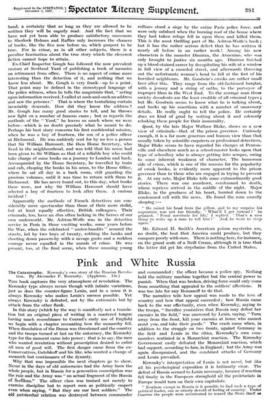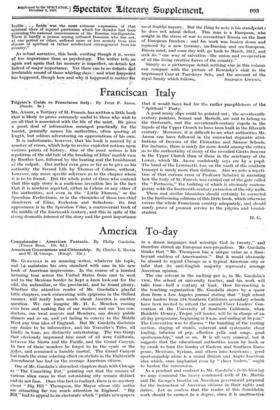Pink and White Russia
This book captures the very atmosphere of revolution. The Kerensky type always recurs though with infinite variations, just as does the counter-figure Lenin, and in a sense it is always Kerensky who makes Lenin's success possible. Yet always Kerensky is defeated, not by the extremists but by attack from the other flank.
In this story (which by the way is manifestly not a transla- tion but an original piece of writing in a mastered tongue having much resemblance to Conrad's early use of English) we begin with a chapter recounting how the monarchy fell. When dissolution of the Duma was threatened and the country and the troops turned at last on the autocracy, the Kerensky type for the moment came into power ; that is to say, the men who wanted revolution without proscription desired to enlist all men of good will. The first danger came from the ex- Conservatives, Gutchkoff and his like, who wanted a change of monarch but continuance of the dynasty.
Why that was impossible the next chapters go to show. Never in the days of old autocracies had the Army been the whole people, but in Russia for a generation conscription was the rule and the Army was " an actual fragment of the Russia Of Serfdom." The officer class was trained not merely to exercise discipline but to report men as politically suspect even when saying, " But they are our best soldiers." The Old patriarchal 'relation was destroyed between commander and commanded : the officer became a police spy. Nothing held the military machine together but the central power to punish. When that was broken, driving force could only come from something that appealed to the soldiers' affections. It
was too late for any Romanoff to do that.
The narrative tells how appeal was made to the love of country and how that appeal succeeded ; how Russia came back to the war effectually, even when Kerensky, saying to the troops, " Sacrifice yourselves that Russia may defeat her enemies in the field," was answered by Lenin, saying, " Turn away from the front, kill your enemies at home who cannot resist you, and take their goods." The crash came when, in addition to the struggle on two fronts, against Germany in the • field and Lenin in the cities, Kerensky's own com- manders mutinied in a Monarchist reaction. The Kerensky Government easily defeated the Monarchist reaction, which had support, according to him, in England ; but the Army was again disorganized, and the combined attacks of Germany and Lenin prevailed.
Kerensky's interpretation of Lenin is not novel, but like all his psychological exposition it is brilliantly clear. The defeat of Russia seemed to Lenin necessary, because if reaction fell finally in the European stronghold all the proletariats in Europe would turn on their own capitalists.
" Nowhere except in Russia is it possible to find such a type of political leader, one so utterly devoid of feeling of country. Under Cearism the people were accustomed to reeard the State itself at
loslile *Lehiri'-was the most extreme expression of that spiritual ulcer of injured patriotism which for decades had been poisoning the national consciousness of the Russian intelligentsia. There is hardly a person among cultured- Russians who has not, at one/ period or 'other, suffered more or less acutely from this disease of spiritual or rather intellectual estrangement from his Country."
As actual narrative, this book, exciting though it is, seems Of less importance than as psychology. -The-writer tells tus again and again that his memory is dniperfeet, on details not indeed of major importance. Yet there can be no definite 4d Irrefittable record of those whirling days : and *That happel)ed has happened, though how and why it happened is matter for
most fruitful inquiry. But the thing to note is his standpoint : he does not admit defeat. This man is a European, who sought in the stress of war to reconstruct Russia on the lines of European freedom ; and his work was beaten down and replaced by a new tyranny, un-Russian and un-European. Russia must, and some day will; go back to March, 1917, and seek its " one way of salvation—the union and co-operation of all the living creative forces of the country."
Simply as a picturesque detail, nothing else in this volume can compare with the picture of Kerensky's visit to the imprisoned Czar at Tsarskoyc Selo, and the account of the











































































 Previous page
Previous page